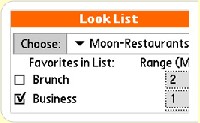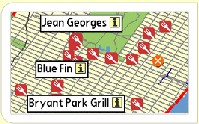
The MadeForOne.com newsletter provides personalization news and information straight to your mailbox. Subscribe Now!


Mass customization and personalization news


Images from the Earthcomber Spot Guides application, showing options being personalized (left) and mapped results (right)
2005-11-03: A company called Earthcomber has introduced books made for mobile devices that combine mapping and personalization. Earthcomber LLC has labelled the new 'mobile books' as "Spot Guides".
Earthcomber LLC created the free technology that incorporates maps and personal favorites with traditional travel, reference and other mainstream publications. Among the first offerings are city guides from Mobil Travel Guide (the company's first venture into mobile publishing) and Avalon Publishing's Moon Metro series.
Spot Guides run on Palm OS phones and PDAs, and provide location sensing and area searching with or without Global Positioning System (GPS). Versions for Windows Mobile, cell phones and BlackBerry devices are in production.
Users with GPS are automatically positioned on Earthcomber maps. Users without GPS can use Earthcomber's intelligent maps to position themselves. In addition, every location and point of interest in Earthcomber is mapped by latitude and longitude, allowing Earthcomber to provide the user with precise, proximity searching based on where the user is at that moment.
Earthcomber draw an analogy with the Apple iPod to describe their product. Much like the iPod has miniaturized music to become portable and personal, Earthcomber Spot Guides present users with their favorite kinds of information as they come upon the actual places where it is most useful. Multiple Spot Guides, unabridged and with photos, can fit onto a single, stamp-sized memory card.
Spot Guides are a "plug-in" to Earthcomber's basic free mobile software and built-in digital maps. The patent-pending technology maintains individual privacy while constantly combing the area each person travels for unlimited numbers of personal interests. This could be anything from an ATM to a waterfall, cup of coffee, museum, bistro, school, golf course, bar or even local events.
Unlike books in print, Spot Guides give a person the option of exploring the electronic guide through hot-linked pages, special icons, photos and searches - all within the context of a book title. As the reader considers any place mentioned, Earthcomber displays the distance to that spot. As the person moves, distances are updated.
Jim Brady, Earthcomber founder, expands on the concept of bookmarking to describing Spot Guides: "Imagine your bookmarks tapping you on the shoulder," he says. "Spot Guides are like books that you can leave 'on'. The idea is that life is so much more interesting, and we could get so much more out of every day, if only we could know what's right around us." Brady previously worked as a new media executive for Harpo, which is owned by TV talk show host Oprah Winfrey.
Many publishers find Earthcomber attractive as a new vehicle for putting out mobile products, and organizations also are turning to Earthcomber to publish guides that are location-aware and ultra-portable: The Greater Minneapolis Convention and Visitors Association packed city history, neighborhood sketches, travel info and member locations into a Spot Guide.
The Spot Guides are being promoted as an alternative to traditional guide books. "With no printing, paper, shipping or shelf-stocking, Spot Guides dodge the usual costs and risks," Brady said.
Guides are sold online at www.earthcomber.com and publisher web sites, and priced typically between $9.50 and $20. Some are given away free, depending on the publisher's intent. Free Earthcomber mapping and personal interest software is also available at the website.
The concept of personalized mobile services (also called 'location-based services') appears to be gathering pace with companies such as Earthcomber and mobile 'social networking' service Jambo Networks.
In the case of Earthcomber, while the 'mobile bookmarking' iea is useful to describe the service to potential customers, it isn't directly related to the bookmarking concept. Bookmarking started out as a way for an individual to mark their favourite online locations. More recently, the development of 'tagging' by sites like Del.icio.us and Furl of internet sites introduced the idea of 'social bookmarking' where web users can 'tag' sites with labels and make them available to friends or the wider world. Earthcomber's Spot Guide service allows users to highlight their interests from a menu, and these are then matched to pre-existing records in the Spot Guide. A true 'mobile bookmarking system' would allow the user to add their own entries to the existing record. This might be for their own use only ('personal mobile bookmarks'). It could also, in theory, be shared with other users ('social mobile bookmarks'). 'Social mobile bookmarking' would allow the Spot Guides to 'learn' from the experiences of users, thus creating a process of continuous improvement to the service.
The one element to Spot Guides that is truly personalized is the location aspect. Any system that tells the user in real time where something is located and how far away it is has very significant benefits. In the tourism sector, it means that a user in an unfamiliar city need not be concerned with having to ask directions (which may itself be a problem if the tourist has limited knowledge of the local language), but can instead simply refer to their Spot Guide. Also, even without the development of mobile bookmarking as described above, updated to Spot Guides with the most recent information can be issued more frequently than would be the case for a printed guide book.
Earthcomber's system provides shielded, peer-to-peer communications between the individual and the location (whether it is a business or simply a point of interest in the landscape) that preserve privacy of the user. National brands can use Earthcomber to put a virtual store-locator directory into the pockets of their customers; those customers will always know where to find the closest location. Local businesses can use Earthcomber, too, to reach out to local residents and long-haul travelers who want what that store offers but don't know where to find it.